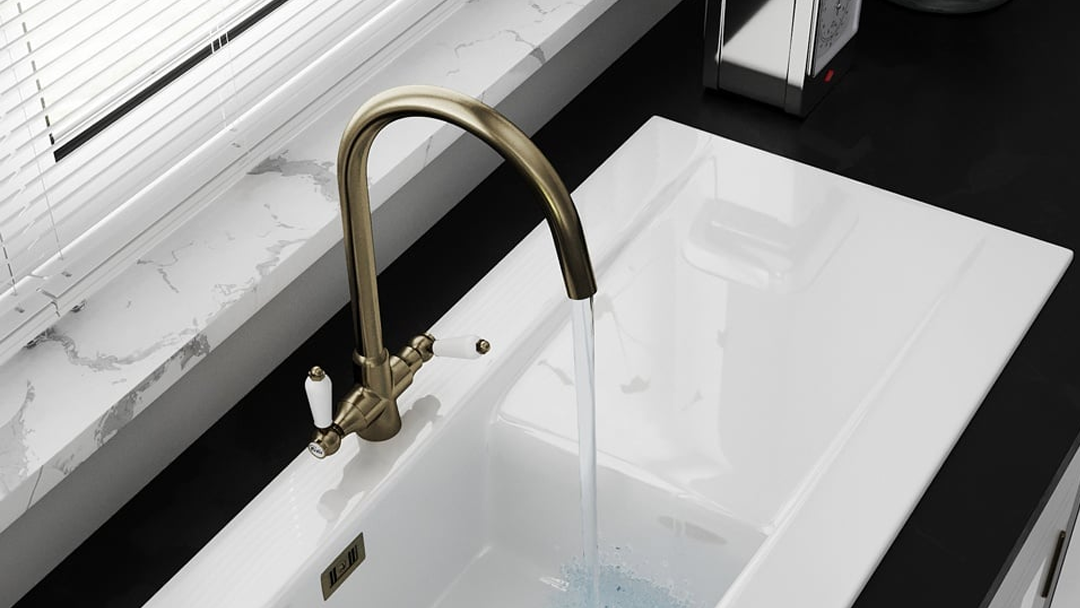
Kitchen Taps and Bleach: Why the Right Cleaner Matters
|
|
Time to read 4 min
Written by: Taps UK
|
Published on
|
Time to read 4 min
If you have looked through any information from manufacturers, retailers, etc, you will struggle to miss some information on "don't use this" and "avoid this" when it comes to cleaning products. Taps UK is no exception, and where we can, we try to stress to our customers to only use hot soapy water or specialist cleaners (see our blog on why cleaning products are worth it).
But the real question is, what is wrong with using these more abrasive cleaners? If you decide to use them, what is going to happen to your tap? I decided to subject a tap part from our warehouse to one of the most common household cleaners - bleach.
The part I used is a tap shoulder (see right), and this is off the Astini Colonial Traditional Bronze tap. Astini offer a 15-year finish guarantee on the tap - so they obviously have confidence that the finish will last for that period with normal use.
I am going to cover the item in bleach and soak it. Obviously, this wouldn't happen in your home, but I am demonstrating what prolonged use can do to the finish of a tap by overexposing it to get the same results in a short period.
I have also slightly scratched the surface of the item to mimic the use of an abrasive pad like a washing-up sponge with the rough side. This damages the protective surface of the tap and allows any cleaners to penetrate to the raw finish. So this test will demonstrate not only how abrasive cleaners are, but also how quickly scratching the surface daily will impact the life of the tap.
I will put the item inside a ceramic cup to contain the bleach around the item.
You can see the item set up above. The bleach is poured over the entire item and then disturbed occasionally to encourage it to attack other parts of the finish. You can see in the first 5 minutes (left is at the start, the middle is 5 minutes), there is no damage to the item, showing that a short exposure (applying the bleach then removing it) would unlikely cause permanent damage to the item. At 20 minutes (the one on the right), you can see that the bleach has started to attack the finish, and is clearly showing the scratch marks I made with the abrasive pad.
The following day, you can see much more prominent damage to the finish of the tap, which has got through to the finish via the abrasive marks I made at the start.
The reactions that were happening between the finish and the bleach actually turned the bleach a strange bluey colour, which I have since removed. I rinsed the tap and then added some more bleach to continue the test.
This damage is permanent, and cannot be removed with cleaning.



Bleach has severely damaged the item, far more than expected in a short period. The product is plated brass, and the bleach has caused a reaction between the copper in the brass and the chemical. This leads to:
Oxidation – green deposits forming on the surface
Discolouration – darkening of the bronze finish
Permanent damage – plating compromised beyond repair
Here’s a helpful guide on bleach and how it affects surfaces.
Unfortunately, all of this damage is permanent. The only solution is to replace the part. This demonstrates that using abrasive chemicals and sponges is highly damaging to the finish of a tap.
Even though this test involved long-term submersion (3 days in bleach), in real life, the same effect can happen gradually:
Regular use of bleach without proper rinsing
Harsh limescale removers recommended by others
Scratchy sponges that wear down protective finishes
Our advice:
Start with hot soapy water for everyday cleaning
For stubborn marks, check manufacturer recommendations
Use specialist cleaners designed for your product
This usually happens when bleach or harsh chemicals react with the copper in brass, leading to oxidation and surface damage.
Use hot soapy water for everyday cleaning. For tougher marks, follow the manufacturer’s advice or use specialist cleaners designed for taps.
Yes. Bleach and abrasive cleaners can strip protective finishes, leaving permanent stains, darkening, or corrosion.
This kind of permanent damage shows how important it is to choose taps that are designed for easy care and long-term durability. Instead of relying on harsh chemicals, selecting the right product from the start can make cleaning effortless and protect your investment.
That’s where Hansgrohe QuickClean faucets come in. These taps feature a special silicone nozzle design that allows limescale and dirt to be wiped away in seconds with just a finger rub—no need for abrasive cleaners or harsh scrubbing. QuickClean technology keeps your faucet looking new, performing at its best, and lasting longer.
Exposure to bleach quickly damages plated brass, as the copper content reacts and oxidises. This results in visible green deposits on the surface and a darkened finish that cannot be reversed.
Regular use of abrasive chemicals or rough sponges gradually erodes the protective coating, leaving the tap vulnerable to corrosion and significantly reducing its lifespan.
The recommended cleaning method is hot soapy water. For stubborn marks, you should first check the manufacturer’s guidance or use a specialist cleaner designed for your product to avoid permanent damage.
Taps UK is a prominent online retailer in the United Kingdom, specializing in a wide variety of kitchen and bathroom products. The company boasts a large selection of taps, sinks, and accessories from both well-known industry brands and its own exclusive lines, catering to a broad customer base that includes the general public as well as trade professionals like developers and builders.
Email Us: hello@tapsuk.com
Call Us: 01527 868500
Get all the latests news and offers from our team right to your inbox
Accepted payment methods:
© 2025 TAPS UK . All Rights Reserved.







